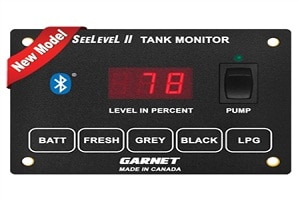So your RV tank sensors are not working? Welcome to the RV community where tank sensors are one of the most common problems.

There are many possible reasons why your sensors would stop working and when they do, functioning with your RV can be difficult. Read on and find out how to deal with this as well as other common problems in this article.
But first, for new RV owners, what are sensors, and do you really need them?
Camper Holding Tank Sensors & Why You Need Them
RV holding tanks store clean water (clean water tank), sink and shower (gray water tank) water, and toilet waste (black water tank).
Holding tank sensors help you monitor the level of water in each at any given time. However, these sensors sometimes give false readings, and that’s when dry camping becomes stressful.
Dry camping, also known as boondocking, refers to camping outside of a regular campground with no hookups like electricity and water.
In other words, you only need holding tank sensors when you dry camp because otherwise, you’ll always be connected to utilities and you won’t have a need to monitor how close you are to running out of water.
You also won’t need black tank sensors to tell you your toilet is about to overflow. Once your toilet stops flushing, you’ll know it’s time to dump, or you can just dump once a week or so.
It’s the same with the gray water tank. You can leave your gray tank’s valve open to prevent it from filling up.
In short, you don’t need to utilize your waste tank sensors if you ALWAYS camp with full hook-ups.
RV Tank Sensors Not Working
For tank sensors, you almost always get what you pay for. It’s common for low-quality sensors to give inaccurate readings.
If you’re parked on a steep incline, for example, your readings can be inaccurate. You also get either a false positive or a false negative for various reasons.
False positives happen when your tank isn’t full but it says it is. This is usually because of muck build-up in the tank that transmits current down the sidewall interior.
False negatives happen when the tank is full but it says it’s empty. When a probe is entirely covered with filth or grease, conductivity is completely cut off.
Probes are the electrical conductivity metals installed in the tanks’ sidewalls.
Common Causes of Sensor Inaccurate Readings
Common causes of sensor failures include corrosion of probes, sludge build-up in probes, mineral deposits from water in sensors, and leaks.
These problems can typically be addressed by cleaning your tank sensors. If cleaning doesn’t work, it may be time to change or upgrade to better-quality probes.
How to Prevent Sensor Problems
Sensor issues can be overwhelming, and while they may not be resolved immediately, there are actions you can take to avoid them in the future.
The following can help prevent sensor issues in the future:
● Every time you flush the toilet, keep your foot on the pedal for at least 10 seconds.
● Every 3-5 days, dump your tanks.
● Every 3-5 dumps, thoroughly flush your tanks.
● Prevent as much grease and food debris from entering your gray tanks as possible.
● Do not use chemical or antibacterial cleaners to clean your toilet, sinks, dishes, or showers.
● After each dry camping/boondocking, deep clean your gray tank. Deep clean black tank twice a year as well.
● If there is no risk of freezing, store your RV with a full black tank of water and a bacteria and enzyme solution.
● Black tank valves should always be closed. Gray is open when on hook-ups and closed when dry camping.
● Use a high-quality bacteria and enzyme product to treat your holding tanks.
● Before you use your toilet, fill it with water.
● Keep a bowl of water in your toilet (unless driving).
If you want to upgrade your RV tank sensors or you need repair and replacement parts, head on to rvupgradestore.com. They have a huge selection of sensors and parts from some of the most popular brands in the industry. Drop by their website or contact them for assistance today at 866-332-7881.
For more information about Patio Mats and RV Power Cords Please visit: RVupgrades.com



